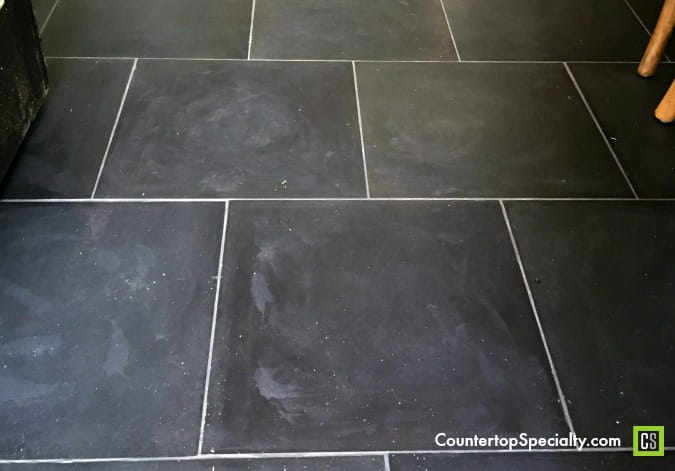Bleach Damaged Marble Floor
QUESTION:
I used bleach on my black marble floors and it damaged them. Looks awful. How do I fix this?
ANSWER:
Using bleach for cleaning marble (or any stone really) is not a good idea. Too caustic.Bleach etches marble. Etching is corrosion that eats away at the marble, which will cause dull and light-colored or clear spots.
Bleach can be used sparingly in certain situations in a very very dilute solution, but more often than not people get the mix wrong and etch their marble. So, it's best just not to use it.
Etching can be fixed using the ETCH REMOVER / Marble Polishing product, which will restore the shine and color.
But it depends on how large an area and how bad the etching is. If your whole floor is etched, or if the etched areas are rough, then you may need to hire a marble maintenance professional to re-surface your floor.
But for small dull spots, rings, spills and/or if a small area of bleach etching (6x6 feet or less), you can do it yourself.
This polishing product is engineered specifically to to restore etched marble and pretty easy to use. Just need a clean cloth and a little elbow grease.
It's for use on "polished" marble only. Don't use it if your marble has a honed or matte finish. The product will make the marble shiny and you don't want that for a matte or honed surface.
On a honed marble, use the Marble Polishing Pads - Drill Kit. This kit can restore both polished and honed finishes.
Note that acidic foods and drinks can etch marble as well so minimize contact. You can't prevent all spills and etching which is why you want to always have some of the Etch Remover product on hand. It's just part of regular marble maintenance.
Ammonia and vinegar damage marble as well and most common brand-name cleaning products like Lysol will etch marble.
For regular cleaning it's best to use cleaners made for marble. This way you avoid guessing about which products to use and all the damage and hassle of marble repair.
Using the wrong products on marble is the most common cause of etching and damage. Using the best and safest marble cleaners will save you a lot of headaches.
Etching can be repaired but it's a pain if it's always happening. Avoiding it is the key to easy maintenance.
Comments for Bleach Damaged Marble Floor
|
||
|
||
|
||
|
||
|
||
|
||
|
||
|
||
|
||


